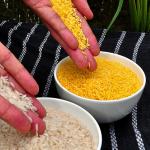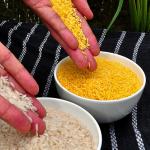Their eyes tell their sad stories as ghostly white irises give way to vacant stares. We can look at them, but they can’t look back at us.
Greenpeace
From the early days of Greenpeace when its members were dodging harpoons and Japanese whalers in outboard motor boats – remember “Save the Whales!” — it has leveraged media savvy and an aptitude for political theater to become a $400 million-
Because most of society is between two and six generations removed from farming, to many people that subject is largely terra incognita, literally and figuratively.
“Vitamin A deficiency [VAD] is the leading cause of preventable blindness in children worldwide,” the American Academy of Ophthalmology noted last year.
Vitamin-A deficiency around the world leads to between 250,000 and 500,000 children going blind – every single year. Half of them die within a year of losing their sight. And several other health problems stem from this urgent issue.
In a huge win for public health and science, Golden Rice is taking a major step towards reality in Bangladesh.
Greenpeace really loves bees so much that they regularly hold bee die ins where they dress up
Patrick Moore was instrumental in the founding of GreenPeace,
In today s New York Post, an
Yet another prominent anti-GMO advocate has come forward to pub







